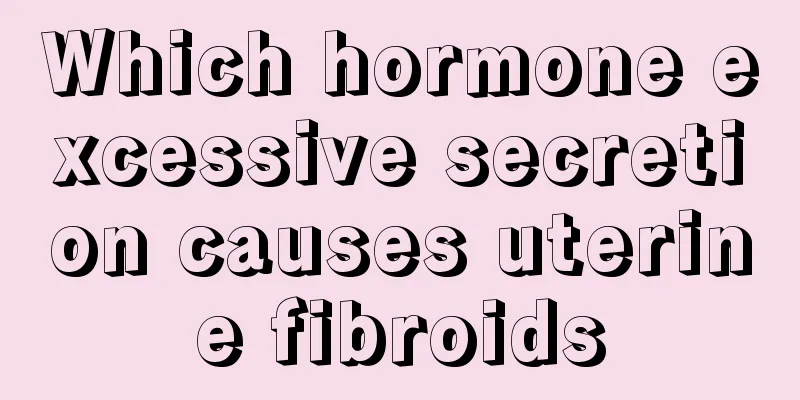Which hormone excessive secretion causes uterine fibroids

|
In recent years, the incidence of uterine fibroids has been getting higher and higher. In fact, the reason why the incidence of uterine fibroids is very high is that most of them are caused by excessive secretion of estrogen in women. Generally speaking, if the estrogen secretion in women's bodies is too high, it is easy to cause some diseases. Although uterine fibroids are benign tumors, they also need to be taken seriously. Severe uterine fibroids will affect women's fertility. What are the symptoms of uterine fibroids 1. Pain: Generally there is no pain symptom. However, when the fibroids undergo red degeneration, when the pedunculated fibroids twist, and when the submucosal fibroids stimulate the uterus to undergo spasmodic contractions. Can cause acute abdominal pain. 2. Anemia: For example, long-term heavy menstrual flow caused by uterine fibroids can lead to secondary anemia. In severe cases, it may manifest as general fatigue, pale complexion, shortness of breath and palpitations. 3. Menstrual changes: Menstrual changes are the most common symptoms of uterine fibroids, which are manifested by increased menstrual flow, shortened or prolonged menstrual periods, and irregular bleeding. Submucosal fibroids can cause bleeding due to increased mucosal area and surface necrosis and infection. When intramural fibroids are larger, the uterine cavity becomes larger, the endometrial area increases, the uterus contracts poorly, or when combined with excessive endometrial hyperplasia, the symptoms are shortened menstrual cycle, increased menstrual flow, and prolonged menstrual period. 4. Increased vaginal discharge: It is common in larger intramural fibroids. Due to the enlargement of the uterine cavity, the glandular secretion increases, resulting in an increase in leucorrhea. When submucosal fibroids are accompanied by infection, the amount of leucorrhea is also high, and sometimes it can be bloody. 5. Compression symptoms: The enlargement of fibroids can compress nearby organs and cause various symptoms. For example, uterine wall fibroids or cervical fibroids can compress the bladder and cause frequent urination, urination problems, and urine retention. Compression of the ureter may result in hydronephrosis. Fibroids on the posterior wall of the uterus can squeeze the rectum and cause difficulty in defecation. 6. Infertility: 25-35% of patients with uterine fibroids may suffer from infertility because the fibroids hinder the fertilized egg from implanting or the fibroids prevent sperm from entering the fallopian tube. |
<<: Can I eat lychees if I have uterine fibroids?
>>: The efficacy and function of the traditional Chinese medicine Rubia cordifolia
Recommend
What are umbilical cord blood stem cells
Stem cells have very broad application prospects....
Can Gamma Knife treat liver cancer? What are the effects and side effects of Gamma Knife in treating liver cancer?
There are about 1 million cases of liver cancer e...
What to do if your legs are not smooth and have chicken skin
Generally speaking, most people have chicken skin...
What are the examination items for liver cancer tumors? What should be noted about the diagnostic criteria of primary liver cancer CT
In the early stage of primary liver cancer, the s...
7 major causes of osteoporosis
Osteoporosis is more common in middle-aged and el...
What are the methods to repair acne scars
Some people who have severe acne during adolescen...
Can adult overbite be corrected
The formation of overbite is related to many fact...
What are the treatments for muscle spasms
Muscle spasm is what we usually call muscle cramp...
Fever at this time is most likely to be cancer
Lymphoma most commonly occurs in the neck. Genera...
What are the symptoms of obsessive-compulsive disorder?
Modern people’s lives are very colorful, but the ...
What's going on with my swollen face, feet and legs?
In our daily life, if we sit for a long time, our...
Can I drink alcohol immediately after cupping?
As the concept of health preservation has become ...
How to treat pus discharge from the urethra?
Many people find that pus flows out of their uret...
Which foods can prevent stomach cancer? Eating them has a big effect
Since gastric cancer is related to "eating&q...
What should I do if I keep having nightmares at night
Dreams can be said to be very wonderful. Of cours...









